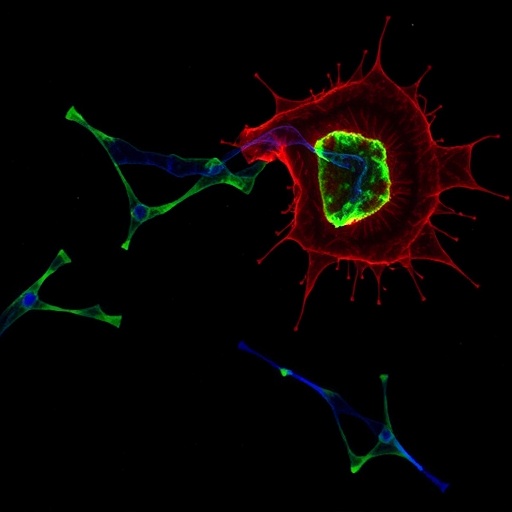In a groundbreaking revelation in the realm of cancer research, recent studies have illuminated the pivotal role of the CCDC137 gene in the progression of bladder cancer. Bladder cancer, a highly prevalent malignancy with significant morbidity and mortality rates, demands thorough investigation into its underlying molecular mechanisms. The research spearheaded by Zhang et al. provides a crucial understanding of how the downregulation of CCDC137 can hinder bladder cancer development, via the modulation of stearoyl-CoA desaturase (SCD), an enzyme crucial for fatty acid metabolism.
The gene CCDC137 has emerged as a significant player in both cellular signaling and metabolic pathways. Its association with various cancers has sparked interest among researchers aiming to unravel the complexities of tumorigenesis. CCDC137 is believed to influence cellular growth and survival, making it a potential target for therapeutic interventions. The findings reported by Zhang and colleagues could pave the way for novel treatment strategies that specifically address bladder cancer at its genomic roots.
By employing cutting-edge techniques such as CRISPR-Cas9 gene editing, the researchers effectively knocked down CCDC137 expression in bladder cancer cell lines. The resulting data were nothing short of illuminating, revealing a marked suppression of cell proliferation, invasiveness, and tumorigenicity. This suppression underscores the gene’s contributory role in malignancy, further validating it as a promising target for therapeutic strategies aimed at halting the progression of bladder cancer.
Beyond merely halting cellular growth, the study intricately details how the downregulation of CCDC137 impacts metabolic pathways, particularly emphasizing its relationship with SCD. SCD is integral in the desaturation of fatty acids, which influences membrane fluidity, lipid signaling, and overall cellular function. The findings suggest that CCDC137 knockdown leads to a decrease in SCD expression, thereby impacting lipid metabolism and, consequently, tumor growth and survival. This interplay between CCDC137 and SCD forms a critical nexus that warrants further exploration, given its implications in cancer biology.
In addition to its potential therapeutic implications, the research also holds promise for enhancing diagnostic and prognostic measures in bladder cancer. The authors propose that assessing the levels of CCDC137 and SCD expressions could yield valuable insights into tumor behavior and patient outcomes. These biomarkers could enable tailored therapeutic strategies, where treatment modalities could be adjusted based on an individual’s specific tumor profile, thus improving the efficacy of interventions.
The authors of this study assert that these findings not only broaden our understanding of the molecular underpinnings of bladder cancer but also highlight the need for multi-faceted approaches in tackling the disease. The interactions between genetic factors, metabolic pathways, and the tumor microenvironment can no longer be considered in isolation. Instead, comprehensive strategies that encompass a holistic view of tumor biology are crucial for advancing cancer treatment.
Furthermore, the implications of the study stretch beyond bladder cancer. The overarching roles of CCDC137 and SCD in metabolism position them as potential candidates for further research in other malignancies. Future studies could elucidate whether similar mechanisms are at play in colorectal, breast, or prostate cancers, broadening the spectrum of CCDC137 research to offer a more universal approach to cancer therapeutics.
The promising findings have ignited discussions within the scientific community regarding the next steps in translational research. Prioritizing drug development that targets CCDC137 and its associated pathways could yield new therapeutic agents that might complement existing treatments, potentially leading to improved survival rates and quality of life for patients battling bladder cancer.
Moreover, the innovative methodologies highlighted in the study could inspire future research designs, encouraging other scientists to adopt similar gene-editing techniques to explore uncharted territories in oncological research. By harnessing the power of CRISPR and other genome editing technologies, the possibilities for novel discoveries in cancer biology are immense.
As the scientific community digests these findings, peer-reviewed scrutiny and validation will be essential to establish the reproducibility of the results. This correction published in the Journal of Translational Medicine serves as a reminder of the dynamic and ever-evolving nature of scientific inquiry, where continuous learning and adaptation are key to progress.
Initiatives aimed at funding further studies and collaborative efforts between research institutions will be crucial for translating these findings from bench to bedside. As researchers continue to dissect the complexities of bladder cancer, a concerted effort to understand the role of metabolic mediators like CCDC137 will certainly enhance our arsenal against this formidable disease.
In conclusion, the work of Zhang et al. represents a significant step forward in cancer research, illuminating the intricate connections between gene expression, metabolic pathways, and cancer progression. As the scientific community delves deeper into the implications of CCDC137 and SCD, new avenues for targeted therapies in cancer treatment may soon be within reach, heralding a new era in the fight against bladder cancer.
Subject of Research:: Bladder Cancer Progression and CCDC137’s Role
Article Title: Correction: CCDC137 knockdown suppresses bladder cancer progression by downregulating SCD
Article References:
Zhang, H., Huang, W., Cai, Z. et al. Correction: CCDC137 knockdown suppresses bladder cancer progression by downregulating SCD. J Transl Med 23, 1225 (2025). https://doi.org/10.1186/s12967-025-07344-y
Image Credits: AI Generated
DOI: 10.1186/s12967-025-07344-y
Keywords: Bladder Cancer, CCDC137, SCD, Gene Editing, Metabolism, Cell Proliferation, Tumor Growth, Targeted Therapy.
Tags: bladder cancer treatment strategiescancer research breakthroughsCCDC137 gene in bladder cancercellular signaling pathways in cancerCRISPR-Cas9 gene editing in oncologydownregulation of SCD enzymegene knockdown effects on cancer cellsimpact on fatty acid metabolismmetabolic pathways in bladder cancermolecular mechanisms of cancer progressiontargeting tumorigenesis in cancertherapeutic interventions for bladder cancer





